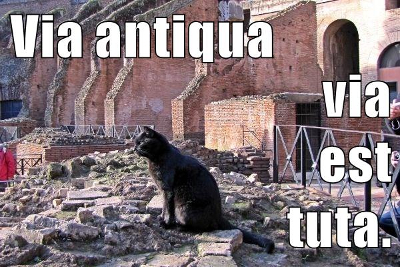What I want to emphasize now is that these words are the nominative case form. There are five different cases in Latin — nominative, genitive, accusative, dative, and ablative — and you will be learning all of those cases one by one. Tomorrow, in fact, you will start learning the genitive case, which is why I wanted to emphasize the nominative case today.
The nominative case is the form of the word that you will find in the dictionary. In a sentence, there is only one thing that a nominative word can do: it is the subject of the sentence and/or it agrees with the subject as the predicate. For example:
- Roma aeterna est.
The word Roma is the nominative subject, and aeterna, agreeing with Roma, is the predicate. (That is a loose, traditional way of using the word predicate; for the more strict use of the term "predicate" in linguistics, see Wikipedia: Predicate.)
So, before we move on to the genitive case tomorrow, here are some sayings where you can practice the nominative case one more time, learning some new first-declension nouns and adjectives that end in -a:
1. Via antiqua via est tuta.
(The) ancient way is (the) safe way.
via an-TI-qua via est tuta
The noun via means "path, road, way," and has been adopted into English as "via." You can also see it in compounds like "viaduct" and "deviate."
The adjective antiqua means "old, ancient," as in English "antique." In English, "antique" can have the sense of outmoded, outdated, even useless, but in Latin, the word antiqua has strongly positively associations, as you can see if you read this Latin dictionary entry.
You have seen the adjective tuta in its masculine form before: Locus medius tutus est. Notice how the noun phrase, via tuta, wraps around the verb: via est tuta.
The idea is that an old, well-established road will safely lead you to your destination, as it has led many others before you. Metaphorically it means that the "old way" is the best way to get anything done.
(Your) fatherland is wherever (it) is good.
PA-tria est ubi-CUM-que est bene
You have seen patria in this saying: Patria mea totus mundus est.
The adverb ubicumque means "everywhere," and it is a compound of the word ubi, "where," which you have seen in many sayings so far, like Ubi veritas, Deus ibi est.
The adverb bene, "well," is related to the word for "good," bonus. You can see Latin bene in many English words like "benefit" and "benevolence."
This is another one of those cosmopolitan sayings which reject the narrow idea that your homeland is a matter of birth. Instead, it is a matter of choice: wherever things go well for you, that can be your homeland.
3. Longa est vita si plena est.
Long is life if (the life) is full.
longa est vita si plena est
You've seen longa before in this saying: Legis manus longa.
You know the word si from this saying: Si satis est, multum est.
Compare the English idiom, "to lead a full life."
4. Nonne anima plus est quam esca?
Isn't life more than food?
nonne A-nima plus est quam esca
The word nonne introduces a question to which the expected answer is "yes." Latin non means "no" or "not," while -ne is a question marker. So in Latin, just like in English, the word "not" can be used to ask a question expecting a positive answer: Is not life more than food?
The noun anima means "soul, spirit," and it also means "the breath of life, life." You can see this Latin root in English "animate" (as opposed to "inanimate").
You've seen quam used for expressing a comparison in this saying: Melior est res quam spes. That is the role of quam in this sentence also: plus quam, "more than."
The noun esca, "food," is related to the verb edere, "to eat." You can see this Latin root in English "escarole" and "esculent."
The implication is that life is more than food, i.e. more than just material substance; instead, life is about the life of the soul, anima, not just esca.
5. Mea culpa, mea culpa, mea maxima culpa.
My fault, my fault, my greatest fault.
mea culpa, mea culpa, mea MAX-ima culpa
You've seen mea in these sayings: Dominus illuminatio mea and Ventus est vita mea.
The noun culpa, "fault, crime, mistake" shows up in English "culpable." We also use the Latin phrase mea culpa in English, "(it's) my fault."
You've seen maxima in its masculine form before: Hodie nullus, cras maximus.
This particular formula is part of the Latin rite of confession in the Catholic Church; you can find out more at Wikipedia: Mea culpa.
Here's a recap:
- Via antiqua via est tuta.
- Patria est ubicumque est bene.
- Longa est vita si plena est.
- Nonne anima plus est quam esca?
- Mea culpa, mea culpa, mea maxima culpa.
Plus the LOLCats!





No comments:
Post a Comment
Comments are limited to Google accounts. You can also email me at laurakgibbs@gmail.com